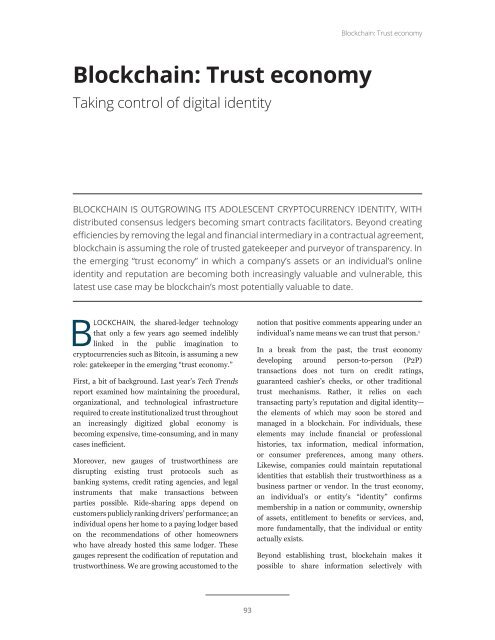Trending the trends Eight years of research
2kcf8xh
2kcf8xh
You also want an ePaper? Increase the reach of your titles
YUMPU automatically turns print PDFs into web optimized ePapers that Google loves.
Blockchain: Trust economy<br />
Blockchain: Trust economy<br />
Taking control <strong>of</strong> digital identity<br />
BLOCKCHAIN IS OUTGROWING ITS ADOLESCENT CRYPTOCURRENCY IDENTITY, WITH<br />
distributed consensus ledgers becoming smart contracts facilitators. Beyond creating<br />
efficiencies by removing <strong>the</strong> legal and financial intermediary in a contractual agreement,<br />
blockchain is assuming <strong>the</strong> role <strong>of</strong> trusted gatekeeper and purveyor <strong>of</strong> transparency. In<br />
<strong>the</strong> emerging “trust economy” in which a company’s assets or an individual’s online<br />
identity and reputation are becoming both increasingly valuable and vulnerable, this<br />
latest use case may be blockchain’s most potentially valuable to date.<br />
BLOCKCHAIN, <strong>the</strong> shared-ledger technology<br />
that only a few <strong>years</strong> ago seemed indelibly<br />
linked in <strong>the</strong> public imagination to<br />
cryptocurrencies such as Bitcoin, is assuming a new<br />
role: gatekeeper in <strong>the</strong> emerging “trust economy.”<br />
First, a bit <strong>of</strong> background. Last year’s Tech Trends<br />
report examined how maintaining <strong>the</strong> procedural,<br />
organizational, and technological infrastructure<br />
required to create institutionalized trust throughout<br />
an increasingly digitized global economy is<br />
becoming expensive, time-consuming, and in many<br />
cases inefficient.<br />
Moreover, new gauges <strong>of</strong> trustworthiness are<br />
disrupting existing trust protocols such as<br />
banking systems, credit rating agencies, and legal<br />
instruments that make transactions between<br />
parties possible. Ride-sharing apps depend on<br />
customers publicly ranking drivers’ performance; an<br />
individual opens her home to a paying lodger based<br />
on <strong>the</strong> recommendations <strong>of</strong> o<strong>the</strong>r homeowners<br />
who have already hosted this same lodger. These<br />
gauges represent <strong>the</strong> codification <strong>of</strong> reputation and<br />
trustworthiness. We are growing accustomed to <strong>the</strong><br />
notion that positive comments appearing under an<br />
individual’s name means we can trust that person. 1<br />
In a break from <strong>the</strong> past, <strong>the</strong> trust economy<br />
developing around person-to-person (P2P)<br />
transactions does not turn on credit ratings,<br />
guaranteed cashier’s checks, or o<strong>the</strong>r traditional<br />
trust mechanisms. Ra<strong>the</strong>r, it relies on each<br />
transacting party’s reputation and digital identity—<br />
<strong>the</strong> elements <strong>of</strong> which may soon be stored and<br />
managed in a blockchain. For individuals, <strong>the</strong>se<br />
elements may include financial or pr<strong>of</strong>essional<br />
histories, tax information, medical information,<br />
or consumer preferences, among many o<strong>the</strong>rs.<br />
Likewise, companies could maintain reputational<br />
identities that establish <strong>the</strong>ir trustworthiness as a<br />
business partner or vendor. In <strong>the</strong> trust economy,<br />
an individual’s or entity’s “identity” confirms<br />
membership in a nation or community, ownership<br />
<strong>of</strong> assets, entitlement to benefits or services, and,<br />
more fundamentally, that <strong>the</strong> individual or entity<br />
actually exists.<br />
Beyond establishing trust, blockchain makes it<br />
possible to share information selectively with<br />
93


